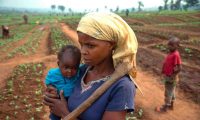
Moïse Katumbi’s Return Portends Shifting Alliances in Congolese Politics
Who is Moïse Katumbi, and why has he returned?
Moïse Katumbi is one of the richest persons in the Democratic Republic of Congo (DRC) – and a political force to be reckoned with. A self-made man, he accumulated his wealth running mining and transport companies in the southern Katanga province. He is popular in Katanga, in part because he is president of a successful football team, Tout Puissant Mazembe, based in the provincial capital Lubumbashi.
Katumbi first fled the DRC to neighbouring Zambia in the chaos of the civil war in the 1990s. In the early 2000s, President Joseph Kabila, who had succeeded his father, Laurent, after his assassination in 2001, invited Katumbi back to the country to help him fix Katanga’s mining sector.… Seguir leyendo »














